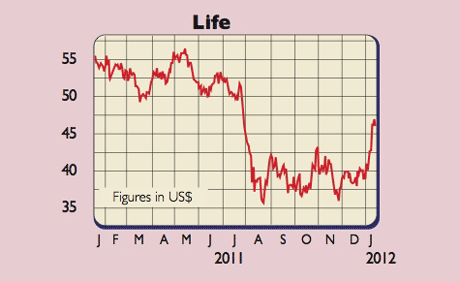Get the latest financial news, insights and expert analysis from our award-winning MoneyWeek team, to help you understand what really matters when it comes to your finances.
You are now subscribed
Your newsletter sign-up was successful
Want to add more newsletters?

Twice daily
MoneyWeek
Get the latest financial news, insights and expert analysis from our award-winning MoneyWeek team, to help you understand what really matters when it comes to your finances.

Four times a week
Look After My Bills
Sign up to our free money-saving newsletter, filled with the latest news and expert advice to help you find the best tips and deals for managing your bills. Start saving today!
By 2020, the way we treat diseases such as cancer, Parkinson's and HIV will be very different. Tens of millions of people will have had their DNA mapped, allowing doctors to prescribe drugs tailored to their genetic make-up. This is the world of personalised medicine.
Last Tuesday it took a big leap forward when US-based Life Technologies launched its new Ion Proton Sequencer. This desktop device, about the size of a printer, can read all three billion characters in a person's DNA in less than 24 hours, at a cost of just $1,000 per person. Until then it had cost $5,000-$10,000 and taken weeks or months to sequence a genome.
Life is also a leader in synthetic biology. The firm has teamed up with (and part owns) Synthetic Genomics, the first firm to manufacture DNA synthetically and successfully inject it into a cell. In the long run this could enable scientists to develop new bacteria that could, for example, eat oil slicks, absorb greenhouse gases, or even produce carbon-free biofuels.
MoneyWeek
Subscribe to MoneyWeek today and get your first six magazine issues absolutely FREE

Sign up to Money Morning
Don't miss the latest investment and personal finances news, market analysis, plus money-saving tips with our free twice-daily newsletter
Don't miss the latest investment and personal finances news, market analysis, plus money-saving tips with our free twice-daily newsletter
But that's for the future. Life, however, already makes money by supplying molecular biology kits, cell-culture reagents and advanced instrumentation to customers across the Americas (48% of revenues), Europe (32%) and the rest of the world (20%).
All these products are designed to accelerate the pace of innovation by making research simpler, faster and more accurate, and are protected by a bank of 3,900 patents and exclusive licences. Around 80% of the business is derived from consumables and services, which means revenues are predictable.
Life Technologies (Nasdaq: LIFE), rated a BUY by Mizuho Securities

Life's addressable market is on track to grow from being worth $18bn in 2009 to $30bn by 2015 an annual growth rate of nearly 9%. Wall Street expects 2011 turnover and earnings per share (EPS) of £3.7bn and $3.71 respectively, rising to $3.9bn and $4.07 in 2012. I value the stock on a 12-times earnings before interest, tax and amortisation (EBITA) multiple. Adjusting for net debt of $2.1bn, that gives an intrinsic worth of $59 a share.
Life does not have the genome-mapping field to itself. Rivals, such as America's Illumina and British-based Oxford Nanopore, are already developing competing systems. There are also the usual concerns of patent challenges and expiries, tighter regulation and government pricing pressure.
Yet with the global population ageing, emerging markets getting wealthier, and developed markets looking for more affordable medicines, the backdrop should be very supportive of Life. Investment bank Mizuho Securities has a target share price of $65. The 2011 results are expected at the start of February.
Rating: BUY at $47 (market cap $8.6bn)
Paul Hill also writes a weekly share-tipping newsletter, Precision Guided Investments. See www.moneyweek.com/PGI, or phone 020-7633 3634 for more.
Get the latest financial news, insights and expert analysis from our award-winning MoneyWeek team, to help you understand what really matters when it comes to your finances.
Paul gained a degree in electrical engineering and went on to qualify as a chartered management accountant. He has extensive corporate finance and investment experience and is a member of the Securities Institute.
Over the past 16 years Paul has held top-level financial management and M&A roles for blue-chip companies such as O2, GKN and Unilever. He is now director of his own capital investment and consultancy firm, PMH Capital Limited.
Paul is an expert at analysing companies in new, fast-growing markets, and is an extremely shrewd stock-picker.
-
 Average income tax by area: The parts of the UK paying the most tax mapped
Average income tax by area: The parts of the UK paying the most tax mappedThe UK’s total income tax bill was £240.7 billion 2022/23, but the tax burden is not spread equally around the country. We look at the towns and boroughs that have the highest average income tax bill.
-
 BBC TV licence fee hike confirmed: can you reduce how much you pay?
BBC TV licence fee hike confirmed: can you reduce how much you pay?The cost of a TV licence fee is set to rise by over 3%, but there are ways to reduce the bill.